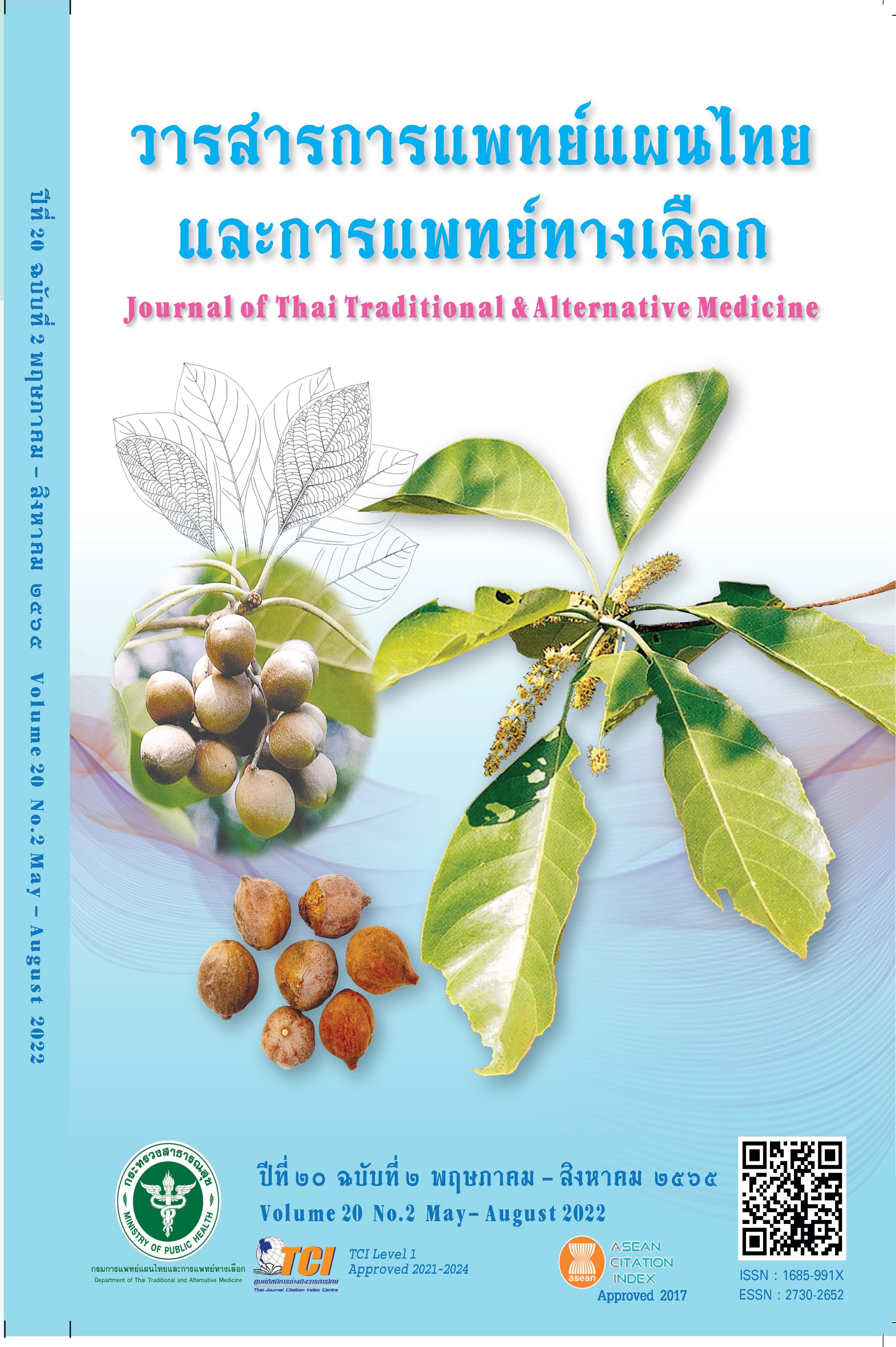ปราบชมพูทวีป การใช้ยาปราบชมพูทวีปเพื่อลดอาการภูมิแพ้ทางเดินหายใจส่วนต้น โรงพยาบาลสมุทรสาคร Use of Prabchompootaweep Formulary for Allergic Rhinitis at SamutSakhon Hospital การใช้ยาปราบชมพูทวีปเพื่อลดอาการภูมิแพ้ทางเดินหายใจส่วนต้น โรงพยาบาลสมุทรสาคร Use of Prabchompootaweep Formulary for Allergic Rhinitis at SamutSakhon Hospital
Main Article Content
บทคัดย่อ
การศึกษานี้เป็นการศึกษาเชิงพรรณนาย้อนหลัง (retrospective descriptive study) โดยการเก็บข้อมูลจากเวชระเบียนผู้ป่วยโรคภูมิแพ้ทางเดินหายใจส่วนต้นที่รับการรักษาด้วยยาปราบชมพูทวีป โรงพยาบาลสมุทรสาคร ตั้งแต่วันที่ 1 มกราคม 2559 ถึงวันที่ 31 ธันวาคม 2559 เครื่องมือคือแบบบันทึกข้อมูล ประกอบด้วย ข้อมูลทั่วไป และข้อมูลการใช้ยาปราบชมพูทวีป วิเคราะห์ข้อมูลโดยใช้สถิติเชิงพรรณนา ได้แก่ การแจกแจงความถี่ และการหาค่าร้อยละ ผลการศึกษาพบว่าผู้ป่วยที่มารับการรักษาส่วนใหญ่เป็นเพศหญิงร้อยละ 80.37 อยู่ในช่วงอายุ 32–60 ปี ร้อยละ 64.49 มีสิทธิการรักษาเบิกได้ร้อยละ 66.36 ไม่มีประวัติการแพ้ร้อยละ 100 มีธาตุเจ้าเรือนเป็นธาตุน้ำร้อยละ 62.61 และส่วนใหญ่ผู้ป่วยที่มารับการรักษา มาด้วยอาการหวัด คัดจมูก จาม ร้อยละ 80.37 รับประทาน 400 มิลลิกรัม 4 ครั้ง ก่อนอาหาร ร้อยละ 98.14 และไม่ใช้ยา/ยาสมุนไพรร่วมร้อยละ 95.35 เคยมารับยาปราบชมพูทวีปเพียงครั้งเดียว ร้อยละ 64.49 และทุกรายไม่พบอาการผิดปกติหลังจากการใช้ยา ผลของการศึกษาครั้งนี้ทำให้ทราบถึงลักษณะทั่วไปของผู้ป่วย และวิธีการใช้ยา ปราบชมพูทวีปที่มารับการรักษาโรคทางเดินหายใจส่วนต้น ซึ่งข้อมูลดังกล่าวอาจนำไปเป็นข้อมูลพื้นฐานในการวางแผนเกี่ยวกับการรักษาผู้ป่วยโรคภูมิแพ้ทางเดินหายใจส่วนต้นด้วยยาปราบชมพูทวีปต่อไป
Article Details

อนุญาตภายใต้เงื่อนไข Creative Commons Attribution-NonCommercial-NoDerivatives 4.0 International License.
เอกสารอ้างอิง
Department of Thai Traditional Medicine and Alternative Medicine. A guidebook on traditional Thai medicine and alternative medicine practice in the clinic of Thai traditional medicine and alternative medicine. Nonthaburi; 2016. (in Thai)
Assanasen P. Current treatment methods for allergic rhinitis [Internet]. 2016 [2017 Sep 20]: Available from: https://www.si.mahidol.ac.th/th/healthdetail.asp?id=1261&aid=1261 (in Thai)
Duanghassadee K. Mental health and job satisfaction of practitioner police officers in urban and rural areas of Khon Kaen province. Khon Kaen: Khon Kaen University; 1994. (in Thai)
Ketkaew C. The teacher in area office of education school district 39 board of education office of the basic education commission has satisfaction by e-Training (Thesis). Bangkok: Siam University; 2013. (in Thai)
Ruxrungtham K. Respiratory allergy [Internet]. 2015 [2017 Sep 23]: Available from: https://allergy.or.th/2016/resources_expert_detail.php?id=97 (in Thai)
Panichakarn N. Allergy in Thai traditional medicine views. Bangkok: Thammasat University; 2014. (in Thai)
Violet C. Evaluation of herbal medicinal product use and opinions of medical service personnel in Long Hospital, Phare province. Chiang Mai: Chiang Mai University; 2009. (in Thai)
Division of Medicine. Textbook of general traditional medicine, branch of medicine 1. Bangkok: Thaiphum Publishing; 2006. (in Thai)
Thai Traditional Medicine Service Promotion Group. Handbook of health promotion and disease prevention according to age groups with Thai traditional and alternative medicine. Bangkok: Samcharoen Panich (Bangkok) Co., Ltd; 2018. (in Thai)
Onthong N, Chonpatathip U, Rajanivat Y, Patthananurak K, Sangvichien S, Kamoltham T. A Comparative study on the effects of Prabchompoothaweep remedy and loratadine in treatment of patients with allergic rhinitis and upper respiratory tract infections at Pathumtani hospital. Journal of Health Education. 2019;42(1):135-45. (in Thai)
Department of Thai traditional and alternative medicine. Guide to Thai traditional medicine and medicines in the national essential medicines list. Pathumthani: Thammasat printing house; 2015. (in Thai)


